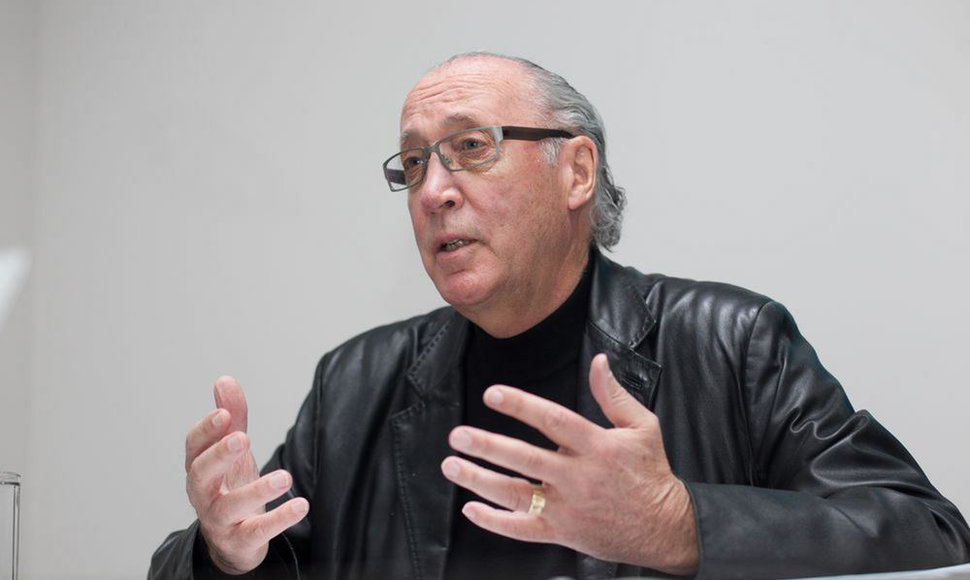Canadian economist Arthur DeFehr, who has a business in Lithuania, offers the experience of Manitoba province in his native Canada as an example to follow. When it faced depopulation, the prairie province started importing foreigners it needed to revive the economy. The results more than met expectations – unemployment started shrinking and remained below the national average even during the downturn.
DeFehr, who has a degree from Harvard School of Economics and a wealth of international experience, knows what he is talking about. He was a godfather of the initiative aimed at attracting immigration to Manitoba. Over a decade ago, he became a member of the Trilateral Commission, has been in the World Economics Forum for many years, and has been developing a furniture business for almost five decades.
“If you're concerned about depopulation, you must think what to do,” DeFehr tells 15min. “People are moving to the city, so maybe Vilnius could keep its population. But if people continue to emigrate, both Vilnius and Kaunas will start shrinking. Social problems will surface – nothing new happening, universities shrinking... A country that has lost almost one third of its population over twenty years is facing a disaster in another 10 or 20 years. Lithuania will no longer be interesting enough for people to want to live here, it will become a place for pensioners.”
The economist, who has recently paid a visit to this country, says he has spotted signs of the approaching crisis – for example, dropping enrolment at LCC International University, a school in Klaipėda he founded.
Hazards of closing up
According to DeFehr, migration policies will be of major importance to the future of new EU member states that can hardly compete with more economically and demographically attractive countries. Politicians are having a difficult time controlling birth and death rates, while with open borders and globalization, population movements are getting out of hand too. At most, the government can have some control over immigration and work towards making the country more attractive to its citizens so they don't leave it.
“Lithuania is losing people, especially those between 15 and 30 years olds. People will be going from place to place, but it makes no sense to assume that, having spent years abroad, they will come back,” DeFehr notes.
What would he tell those Lithuanians who are less than thrilled about welcoming immigrants, who fear for their jobs, or do not want to live close to people of different creed or appearance? “And what would you tell a Lithuanian who was moving to Chicago?” he replies.
Instead, DeFehr suggests trying to imagine what Lithuania might look like in 10, 20, or 40 years without a well-considered immigration policy. There are no alternatives, he says, it makes no sense for developed countries to seal themselves shut in order to remain “pure”. Immigration cannot be switched on or off at will – one needs a comprehensive programme for a hundred years, since today's newcomers will have kids and grandkids who will form part of the society.
“After the collapse of the USSR, everything changed so fast for you, shockingly so. You want to be part of a bigger society. How will you do it – by thinking and planning or haphazardly, by bringing in temporary workers? Would they make for the best immigrants?” DeFehr asks, rhetorically. “Learn from others' successes and mistakes. The sooner you start working, the better the results.”
Welcoming to immigrants
As an example of inspired immigration policy, DeFehr cites a programme implemented in Canada's Manitoba province. His native Winnipeg, with a population of 730 thousand, is the capital of Manitoba and the eighth-biggest city in the country.
Agriculture forms the backbone of the economy in this province in central Canada, ass well as transport, mining, forestry, energy, and tourism.
Manitoba received many immigrants between 1870 and 1930, a little fewer after World War Two. Cold climate deterred some potential newcomers, while as fertility rates start dropping, more and more people – especially young and well-educated – relocated to more economically advanced regions of Canada.
Manitoba was suffering depopulation, industries felt shortage of skilled labour. And that was when they introduced the Provincial Nominee Program to select most suitable immigrants.
DeFehr says that weather in Winnipeg is even worse than in Lithuania – it is like Siberia. However, the programme, introduced in 1998, boosted immigration to Manitoba by 500 percent. Almost all newcomers have successfully stayed on and learnt English. A number of artistic and enterprising people settled in the province. The central government was pleasantly surprised – no one expected that this and similar provinces could attract skilled labour force, keep it, and not have to pay with negative social effects.
No shortage of jobs
Manitoba made a deal with the federal government that it would be able to choose independently which immigrants to admit. It developed a system to assess skills and qualities. An applicant would be awarded points for a particular kind of education, for speaking English and French, for having relatives already settled in the province, etc. The criteria helped select not only immigrants with required skills, but also those more likely to integrate into the society.
A corresponding national programme was based on the education criterion. However, many newcomers had degrees that were not recognized by local employers, so medical doctors would have to drive cabs to make a living. Manitoba's authorities, meanwhile, paid more attention to skills, while degrees and language fluency were not the deciding factors.
In evaluating potential newcomers, a job offer was key. It meant a guaranteed source of income. Additional points would be given for successful professional experience, good family relations, community involvement, ties to families, communities, ethnic and religious groups already settled in Canada – all this pointed to a higher likelihood of successful integration.
Since 1985, Canada has experienced an immigration boom, while Manitoba received relatively fewer newcomers. Before the programme, immigration to the province was about 3 to 4 thousand a year, while in 2010, the number of “selected” immigrants was 12 thousand. Curiously, throughout the period, unemployment in Manitoba stayed significantly lower than the national average and did not grow even as immigrant communities expanded or the economy entered a downturn.
DeFehr admits that the programme sounds a little discriminatory. But immigrants are discriminated everywhere – they are judged by their education, wealth, truck driver's licence, etc. In Manitoba, the central criterion was one's ability to integrate. For example, Chinese newcomers preferred Canada's metropolises with well-established Chinese communities, while Winnipeg accommodated more newcomers from the Philippines – even both are East Asian nations.
Bad example of Germany
Before the programme was implemented, Manitoba's authorities surveyed whether the society would accept the newcomers. Manitobans turned out to be more welcoming than several other provinces – perhaps people there still remembered their immigrant ancestry.
DeFehr is critical of Germany's Gastarbaiter (guest worker) programme – the thousands of people who came to West Germany after the Second World War to help rebuild the country. It was thought that the foreigners would go back home afterwards, so no one paid any particular attention to their integration. Many did indeed went back, but some, particularly Turks, decided to stay. Some of them still hold only Turkish passports today.
“Without an integration plan, there will be three ghetto generations, people will not feel part of the country and this will turn into a long-term problem. Germans do not want to have any more immigration, because they think it's bad. Well yes, most probably because they handled it badly,” DeFehr is critical.
“It was in fact biculturalism that failed. One big part of the society is hard to integrate into another, it is easier to have ten small ones and work with this variety. It is a challenge for Lithuania. Say, you bring many Russian-speakers from Eastern Europe. This would be a step back – there will be Lithuanian-speakers and Russian-speakers. You'll always have Russians living here, but perhaps it would be better to admit other peoples, otherwise you'll just strengthen one group. With more diverse communities, they will have to become something else,” DeFehr suggests.
Lithuania has no strategy
Dr. Karolis Žibas, junior research fellow at the Ethnic Research Institute:
“EU member states pursue quite similar immigration policies – in a sense, they are discriminatory. Each country usually builds its immigration policy on security and economic concerns rather than human rights. The states aim to attract skilled labour – and so does Lithuania.
“The only difference might be that in most countries, including our own, immigration policies are centralized, pursued by the national government rather than municipal. Local governments in the EU implement integration programmes.
“In fact, Lithuania does not have a long-term immigration strategy, there's only an administrative apparatus issuing work and residency permits.
“To begin with, we should consider a long-term national immigration policy, only then can we start thinking about separate municipalities. Permits are issued based on an approved list of wanted professional skills. People with certain professions can come, while others cannot. So what we have is a policy of labour immigration. What usually follows next is family reunion – immigration of those workers' family members.
“The 2007 Economic Migration Regulation Strategy and Immigration Policy Guidelines identify four prioritized countries and regions of origin: Ukraine, Belarus, Moldova, and South Caucasus. Preference is given to culturally close countries. But if we want to attract skilled labour and at the same time we limit countries of origin – there is a contradiction. If you seek skilled labour, country of origin shouldn't matter. And if you seek nationals of particular countries, you limit yourself in terms of attracting people that the state needs.”













